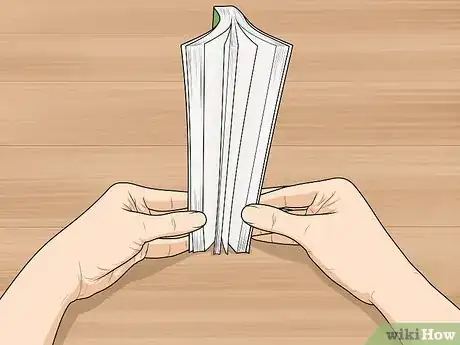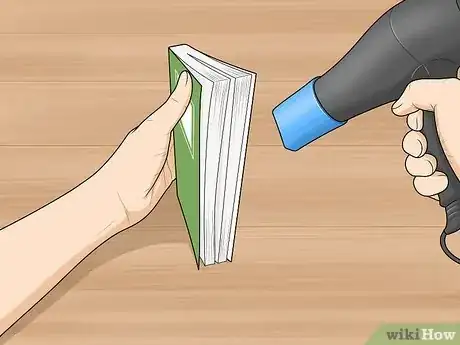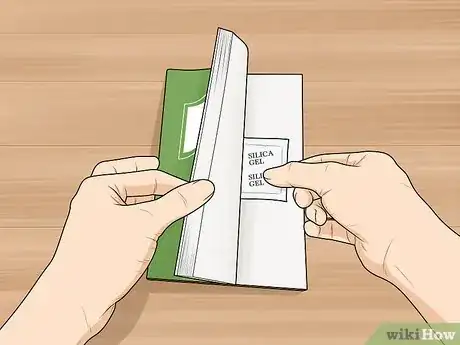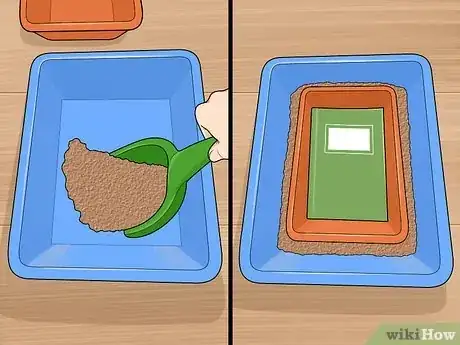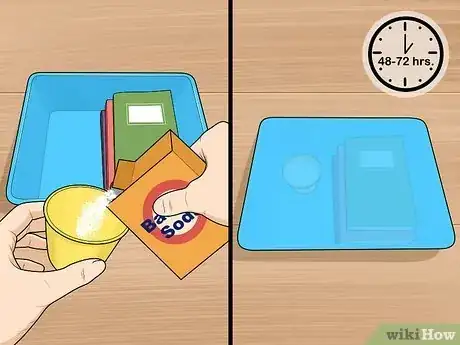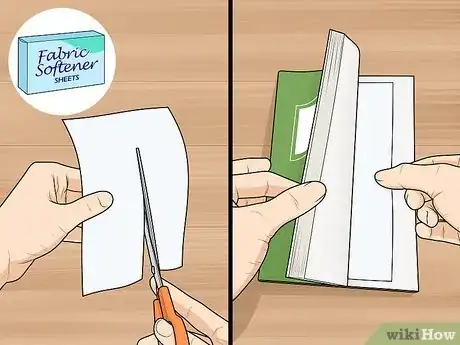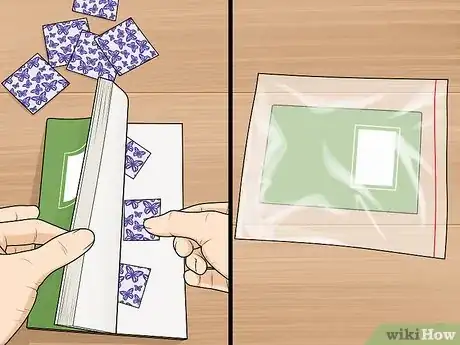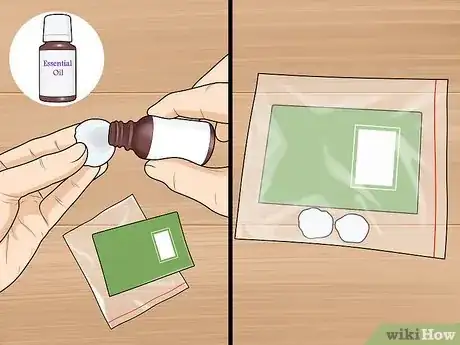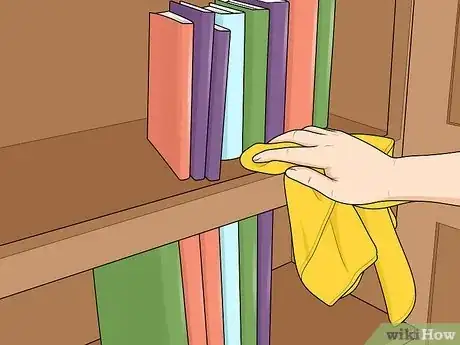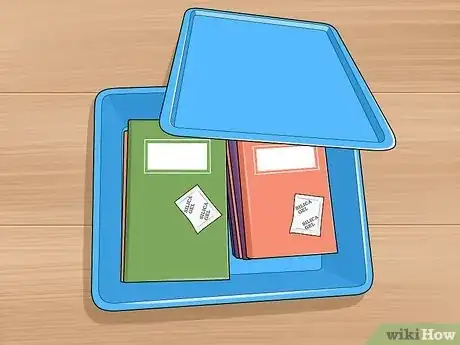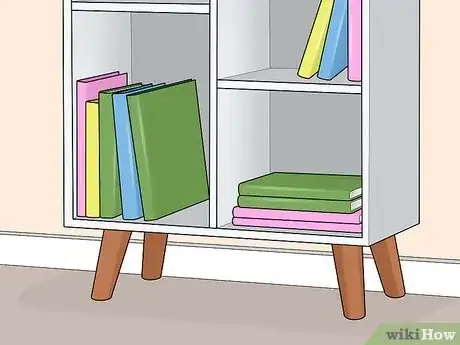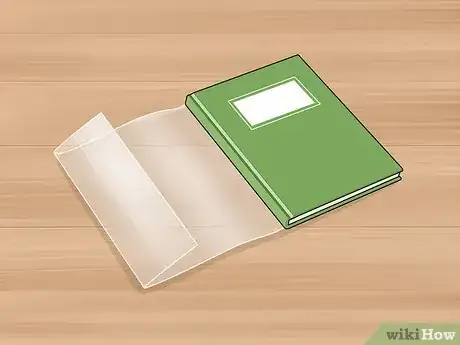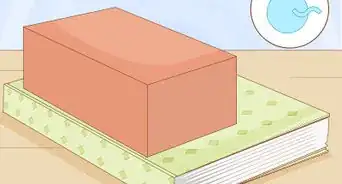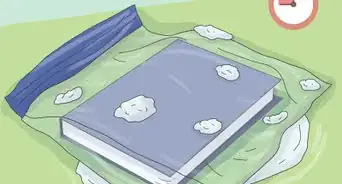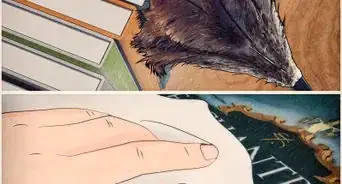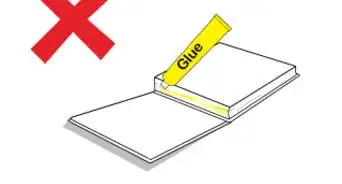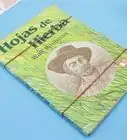This article was co-authored by wikiHow Staff. Our trained team of editors and researchers validate articles for accuracy and comprehensiveness. wikiHow's Content Management Team carefully monitors the work from our editorial staff to ensure that each article is backed by trusted research and meets our high quality standards.
wikiHow marks an article as reader-approved once it receives enough positive feedback. This article has 18 testimonials from our readers, earning it our reader-approved status.
This article has been viewed 501,335 times.
Learn more...
Old books are wonderful treasures to come across and can even be worth money. However, many old books carry a distinct, musty smell. Between drying the pages and using an absorbent to remove odors, you can remove the mildew smell from your beloved books.
Steps
Airing out Books to Remove Odor
-
1Fan out the pages of your book. Stand the book upright on a table. Fan out the pages gently. If your fingers can't disentangle pages without ripping them, use a letter opener and tweezers to separate pages. Alternatively, blow toward the top of your book to fan the pages out.
-
2Use a hairdryer to dry pages. If you would like to speed up the process, you can aim a hairdryer at the pages of your book. Keep it on a warm setting to avoid books becoming affected by heat damage. Continue aiming the hairdryer at your upright book until the pages are dry.Advertisement
-
3Let books stand to dry in a spot free of moisture. Either choose a warm spot inside your home or place the book in the sun. Only place the book in direct sunlight if your book isn't valuable. Direct sunlight may fade the book and, especially for older books, this could lead to permanent disintegration, discoloration, and the curling up of the pages. Ensure that every page is dry before returning the book to its shelf.
Using an Absorbent to Remove Odors
-
1Use silica packets to remove moisture. You can purchase silica gel packets from an arts and crafts store; these keep things dry by attracting any moisture.[1] Place these within the pages of your book and leave them for about three days. If you are worried about creating indents in the pages, only leave them in the book for one day.[2]
-
2Try kitty litter. You will need a large container, such as a Rubbermaid tub, and a smaller container. Fill the larger container halfway with kitty litter, which will act as an absorbent. Place your book at the bottom of the smaller container. Place it inside the larger container that is filled with cat litter.[3]
- Leave the book to sit in the absorbent for a few days. Check every few days. If the odor has gone, remove the book or books and dust off (a new paint brush is ideal for dusting). If not, repeat until the book smells better.
- Store in a clean, dry place to avoid reintroducing mildew.
-
3Try baking soda. Place a cup of baking soda into a plastic box or bin. Place the book or books (this method is good for more than one book) inside and seal the lid well. Let it sit for 48-72 hours, and then check. Repeat this process until the odor is gone.
- Another approach if you live where it's dry and sunny: Sprinkle baking soda between every 10 pages or so. Leave the book open outside during the daytime for a few days in a row, turning pages often. Continue until it smells better. This won't work for all mildew or musty odors, but it can be helpful for some. This is not advised for valuable or antique books.
-
4Place newspaper between the pages. Place a sheet of newspaper between every few pages of the book. Leave the newspaper in the book for three to five days. Do not use this method on valuable or old books, since newspaper is acidic and may transfer ink to the book.
Hiding the Odor
-
1Use fabric softener sheets. These sheets absorb odors from fabric and they can do so for books, too. Again, the oils in dryer sheets can damage books, so be mindful when using this method. Cut a bunch of sheets into thirds, and put one between every 20 pages or so in the smelly book. Keep the book in a zipper bag a few days, then the musty smell should be gone. Try the following:
- This method is good for preventing the musty smell of books as well––just put a piece of a fabric softener sheet in every fifth book, or so, on your bookshelf.
-
2Cut a small square of fresh, fragrant drawer liner. Place it inside a book. Use 2-3 pieces, depending on the size of the book. Then, place the book inside a resealable plastic bag. Let it sit in a dry spot for a week or two.
- Check to see if the fresh odor has been transferred to the book. Continue until the book smells better.
-
3Use strong essential oils. Add drops of an essential oil like lavender, eucalyptus, or tea-tree oil to cotton balls to a sealable plastic bag. Add the book to the plastic bag and seal. Remove your book after a few days. Due to the risk of oil spots, only do this with less valuable books that you want to read, such as textbooks.
Storing Books Properly
-
1Check storage areas beforehand. The storage area should be dry and temperate, as cold can encourage dampness and heat can dry out paper, causing it to crumble. Excessive humidity is bad for books, so either find storage with low humidity or reduce the humidity.[4]
- Check the attic or basement for leaks, mildew and dampness.
- Check your storage facility for bad odors or signs of mildew before storing your book there.
-
2Use appropriate storage containers. Choose plastic boxes if the storage area is prone to leaks or dampness. Also, add silica gel sachets in case of condensation.
-
3Plan your shelving carefully. Don't overfill your bookshelves. Ensure that there is adequate air circulation between books. Check to make sure that bookcases are not standing against cold, moldy, or damp walls.
-
4Add dust jackets to books. These clear jackets will keep moisture away from your beloved book. It's easier and cheaper to replace dust jackets than to replace the book cover or its binding, so dust jackets offer an affordable solution.
Community Q&A
-
QuestionCan old, very dark, un-typed photos be restored?
 Kimberly JacksonCommunity AnswerYes. There are photo huts and freelancers who specialize in this area. Look at their portfolios before hiring.
Kimberly JacksonCommunity AnswerYes. There are photo huts and freelancers who specialize in this area. Look at their portfolios before hiring. -
QuestionDoes this method kill the mold, or just reduce the odor? Is this a solution for someone physically sensitive to the mold? If not, can you recommend alternatives?
 CanastaCommunity AnswerAs a used bookseller, the method I have most commonly encountered is to place the book in a plastic box of dry, yes unused, cat litter, and close the box with the lid. Leave the book in for several days and, theoretically, the dry clay cat litter will help neutralize the moisture and the odor.
CanastaCommunity AnswerAs a used bookseller, the method I have most commonly encountered is to place the book in a plastic box of dry, yes unused, cat litter, and close the box with the lid. Leave the book in for several days and, theoretically, the dry clay cat litter will help neutralize the moisture and the odor. -
QuestionWhat should I do to rescue wet photos that are stuck together?
 Community AnswerIf they are dried and stuck together. they can be submerged in a pan of cool water until they absorb enough to be able to peel apart. You can start to peel them apart while still submerged. It's like peeling off a sticker. Once the peel begins without tearing, it gets easier as long as you continue to peel slowly. Peeling too quickly will rip the surface of the photo away from the backing. If they are not beginning to peel, submerge for a few more minutes until they soften. You could also apply water between the sticking surfaces with an eyedropper.
Community AnswerIf they are dried and stuck together. they can be submerged in a pan of cool water until they absorb enough to be able to peel apart. You can start to peel them apart while still submerged. It's like peeling off a sticker. Once the peel begins without tearing, it gets easier as long as you continue to peel slowly. Peeling too quickly will rip the surface of the photo away from the backing. If they are not beginning to peel, submerge for a few more minutes until they soften. You could also apply water between the sticking surfaces with an eyedropper.
Warnings
- If the book is a valuable collectible, don't do anything before seeking out an archival preservation or book restoration specialist for professional advice or services. Local dealers in rare books are a good place to start.⧼thumbs_response⧽
- Avoid prolonged direct sunlight and other heat sources (radiators, storage in metal sheds) and bright light sources (plant grow lamps, halogen lights near bookshelves). These drastically accelerate damage from the paper's own acids.⧼thumbs_response⧽
References
- ↑ http://www.makelifelovely.com/2013/01/6-uses-for-silica-gel-packets-dont.html
- ↑ https://www.realsimple.com/home-organizing/cleaning/musty-smell
- ↑ https://www.hunker.com/12162284/how-to-remove-mildew-smell-from-books
- ↑ http://www.biblio.com/book-collecting/care-preservation/prevent-remove-mold-mildew/
About This Article
To remove the mildew smell from a book, stand the book upright and fan out the pages. If you want to speed up the drying process, run a hairdryer on the warm setting over the pages. Alternatively, place absorbent materials such as silica packets between some of the pages in the book for 1 to 3 days. You can also put the book in a small container, fill it with kitty litter or a cup of baking soda, and leave it for a few days. If you like, once the moisture is gone you can hide any lingering odor by placing a few drops of essential oil on a cotton ball, putting it in a sealable bag with the book, and letting it rest for a few days. To learn how to use fabric softener sheets to mask the mildew smell in books, keep reading!
